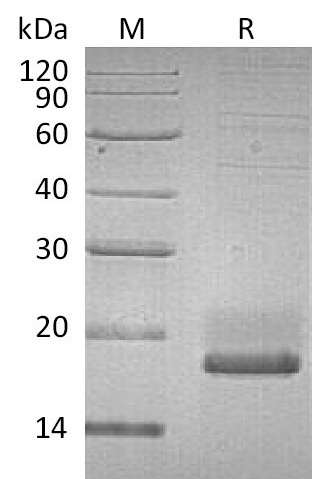 您的购物车当前为空
您的购物车当前为空
SUMO3 Protein, Human, Recombinant (HEK293, His)
一键复制产品信息别名 Ubiquitin-like protein SMT3A, SUMO-3, SUMO-2, Smt3A, SMT3 homolog 1, Small ubiquitin-related modifier 3
Small ubiquitin-like modifier (SUMO), also known as SUMO homologue and SMT3, is a member of the superfamily of ubiquitin-like polypeptides that become covalently attached to various intracellular target proteins as a way to alter their function, location, and/or half-life. Small ubiquitin-like modifiers include SUMO1, SUMO2, SUMO3, and SUMO4. Except for SUMO4, all other SUMOs are ubiquitously expressed, including in the brain. In human, SUMO2 and SUMO3 are two highly homologous proteins, collectively called SUMO2/3. Several studies suggest that SUMO3 are associated with pathogenesis in several neurological diseases, including Alzheimer's disease, Parkinson's disease, and cerebral ischemia/stroke.

SUMO3 Protein, Human, Recombinant (HEK293, His)
一键复制产品信息Small ubiquitin-like modifier (SUMO), also known as SUMO homologue and SMT3, is a member of the superfamily of ubiquitin-like polypeptides that become covalently attached to various intracellular target proteins as a way to alter their function, location, and/or half-life. Small ubiquitin-like modifiers include SUMO1, SUMO2, SUMO3, and SUMO4. Except for SUMO4, all other SUMOs are ubiquitously expressed, including in the brain. In human, SUMO2 and SUMO3 are two highly homologous proteins, collectively called SUMO2/3. Several studies suggest that SUMO3 are associated with pathogenesis in several neurological diseases, including Alzheimer's disease, Parkinson's disease, and cerebral ischemia/stroke.
| 规格 | 价格 | 库存 | 数量 |
|---|---|---|---|
| 5 μg | ¥ 289 | 6-8日内发货 | |
| 10 μg | ¥ 460 | 6-8日内发货 | |
| 20 μg | ¥ 682 | 5日内发货 | |
| 50 μg | ¥ 1,170 | 5日内发货 | |
| 100 μg | ¥ 2,130 | 5日内发货 | |
| 200 μg | ¥ 3,920 | 5日内发货 | |
| 500 μg | ¥ 8,860 | 5日内发货 | |
| 1 mg | ¥ 12,600 | 5日内发货 |
产品介绍
| 产品描述 | Small ubiquitin-like modifier (SUMO), also known as SUMO homologue and SMT3, is a member of the superfamily of ubiquitin-like polypeptides that become covalently attached to various intracellular target proteins as a way to alter their function, location, and/or half-life. Small ubiquitin-like modifiers include SUMO1, SUMO2, SUMO3, and SUMO4. Except for SUMO4, all other SUMOs are ubiquitously expressed, including in the brain. In human, SUMO2 and SUMO3 are two highly homologous proteins, collectively called SUMO2/3. Several studies suggest that SUMO3 are associated with pathogenesis in several neurological diseases, including Alzheimer's disease, Parkinson's disease, and cerebral ischemia/stroke. |
| 生物活性 | Activity has not been tested. It is theoretically active, but we cannot guarantee it. If you require protein activity, we recommend choosing the eukaryotic expression version first. |
| 研究背景 | Small ubiquitin-like modifier (SUMO), also known as SUMO homologue and SMT3, is a member of the superfamily of ubiquitin-like polypeptides that become covalently attached to various intracellular target proteins as a way to alter their function, location, and/or half-life. Small ubiquitin-like modifiers include SUMO1, SUMO2, SUMO3, and SUMO4. Except for SUMO4, all other SUMOs are ubiquitously expressed, including in the brain. In human, SUMO2 and SUMO3 are two highly homologous proteins, collectively called SUMO2/3. Several studies suggest that SUMO3 are associated with pathogenesis in several neurological diseases, including Alzheimer's disease, Parkinson's disease, and cerebral ischemia/stroke. |
| 种属 | Human |
| 表达系统 | HEK293 Cells |
| 标签 | C-6xHis |
| 蛋白编号 | P55854 |
| 氨基酸序列 | Ser2-Gly92 |
| 蛋白构建 | Ser2-Gly92 |
| 蛋白纯度 | Greater than 95% as determined by reducing SDS-PAGE. (QC verified)  |
| 缓冲液 | Lyophilized from a solution filtered through a 0.22 μm filter, containing PBS, pH 7.4. |
| 复溶方法 | Reconstitute the lyophilized protein in distilled water. The product concentration should not be less than 100 μg/ml. Before opening, centrifuge the tube to collect powder at the bottom. After adding the reconstitution buffer, avoid vortexing or pipetting for mixing. |
| 别名 | Ubiquitin-like protein SMT3A, SUMO-3, SUMO-2, Smt3A, SMT3 homolog 1, Small ubiquitin-related modifier 3 |
| 内毒素 | < 0.1 ng/µg (1 EU/µg) as determined by LAL test. |
| 分子量 | 20 KDa (reducing condition) |
| 运输方式 | In general, Lyophilized powders are shipping with blue ice. Solutions are shipping with dry ice. |
| 存储 | Lyophilized powders can be stably stored for over 12 months, while liquid products can be stored for 6-12 months at -80°C. For reconstituted protein solutions, the solution can be stored at -20°C to -80°C for at least 3 months. Please avoid multiple freeze-thaw cycles and store products in aliquots. |
计算器
剂量转换
对于不同动物的给药剂量换算,您也可以参考 更多





 还可以
还可以
 |
|